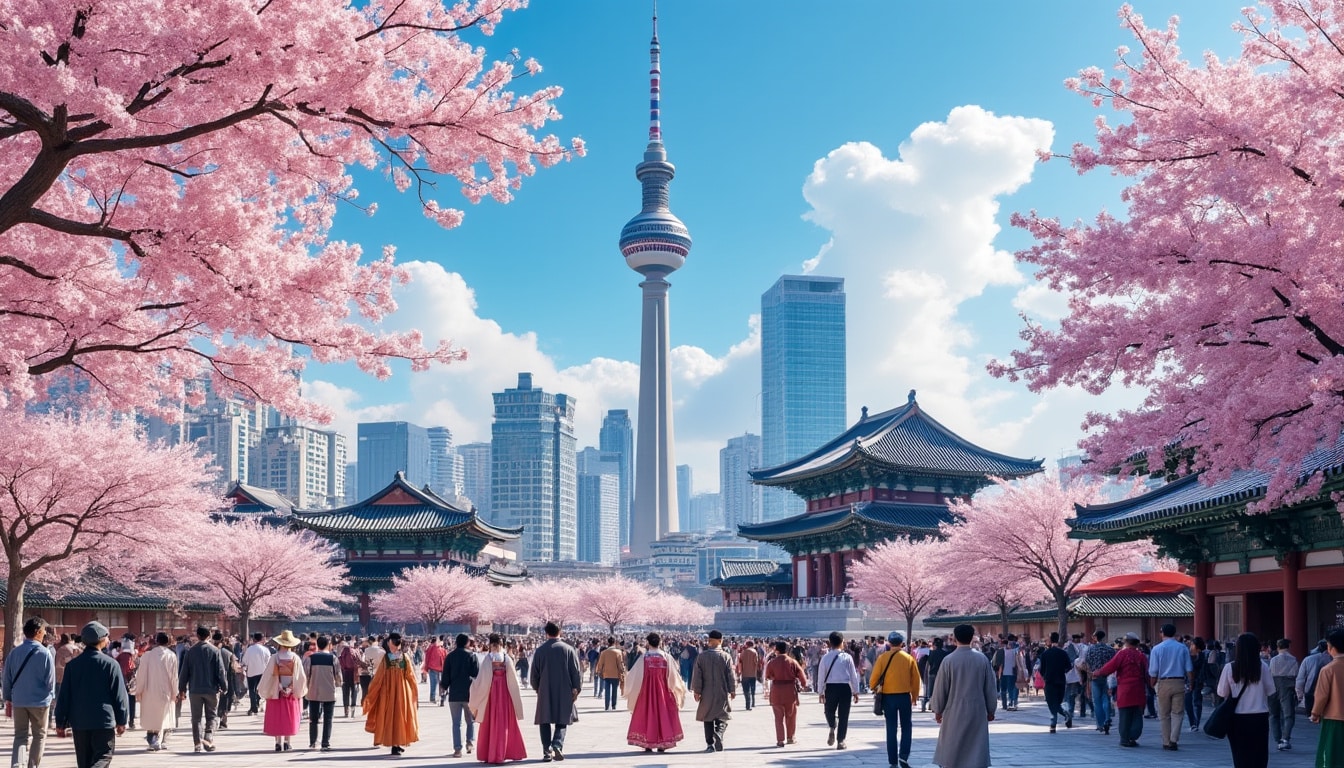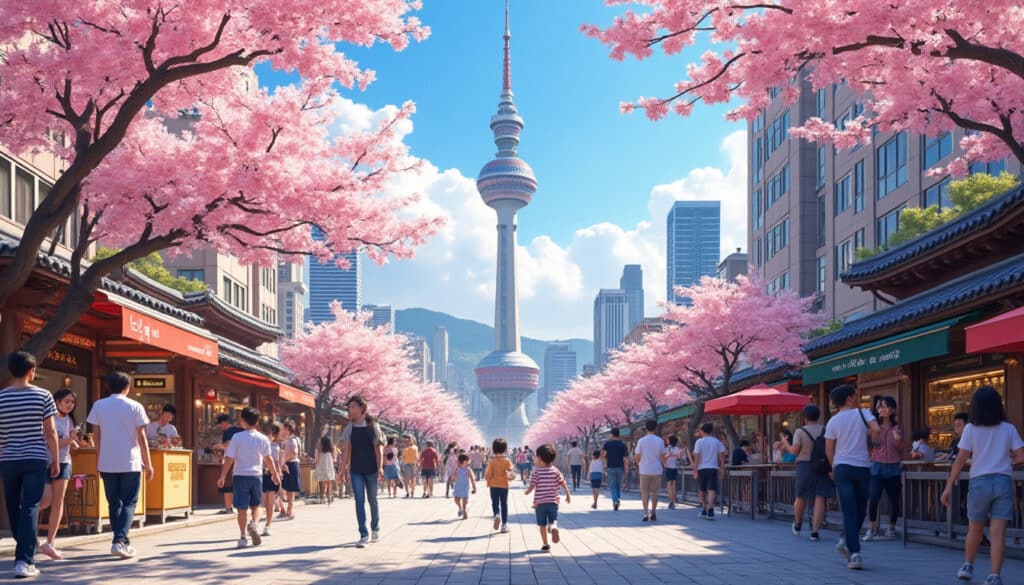Seoul, the bustling capital of South Korea, seamlessly integrates the ancient with the ultramodern, capturing the hearts of all who visit. Enveloped in history, culture, and innovation, this dynamic city is not just a hub for technology and business but also a unique cultural mosaic. From its high-tech skyscrapers and cutting-edge infrastructure to its ancient palaces and vibrant street markets, Seoul is a city that tells a thousand stories. Whether you’re traversing its historic alleys or marveling at its futuristic skyline, Seoul offers an experience like no other. Join us as we explore the fundamental aspects of this enigmatic city, revealing its economic prowess, cultural treasures, and daily life intricacies.
Seoul’s Historical Journey: A Tale of Resilience and Growth
Seoul’s history is a captivating one, with roots tracing back over 2,000 years. Established in 18 B.C. by the Baekje Kingdom, one of the famed Three Kingdoms of Korea, it has been a cornerstone in Korea’s historical narrative. The city’s name evolved through various iterations, with its modern name, Seoul, believed to originate from ‘Seoraneol,’ a term pointing to its status as a capital city.
Throughout its existence, Seoul has seen the rise and fall of dynasties and empires. During the Joseon Dynasty, it was more than a political epicenter; it was a cultural beacon, epitomized by opulent palaces like Gyeongbokgung and Changdeokgung, now UNESCO World Heritage Sites. These palaces are not just relics but serve as living testimonials to Seoul’s rich past.
In the early 20th century, during Japanese colonization, the city was renamed Gyeongseong, a period marked by hardship and transformation. After Korea regained independence in 1945, the city’s name reverted to Seoul, and it embarked on a rapid journey of reconstruction and modernization. However, the Korean War (1950-1953) left the city in ruins, yet Seoul’s resilience shone through as it rose from the ashes to become a thriving metropolis.
Present-day Seoul is recognized as a “special city,” a direct-controlled municipality, emphasizing its unique administrative status with governance akin to that of a province. Today, it remains a tapestry of the past and future, with heritage sites such as the Jongmyo Shrine and the majestic Hwaseong Fortress, offering glimpses into its illustrious history.
- 🏛️ Founded in 18 B.C. by the Baekje Kingdom.
- 🏯 Home to palatial sites like Gyeongbokgung and Changdeokgung.
- 🚀 Survived Japanese colonization and the Korean War.
Seoul’s evolution is a testament to its resilience and ability to adapt and flourish. This historical richness makes it a vibrant place where every street and structure has a story to tell.
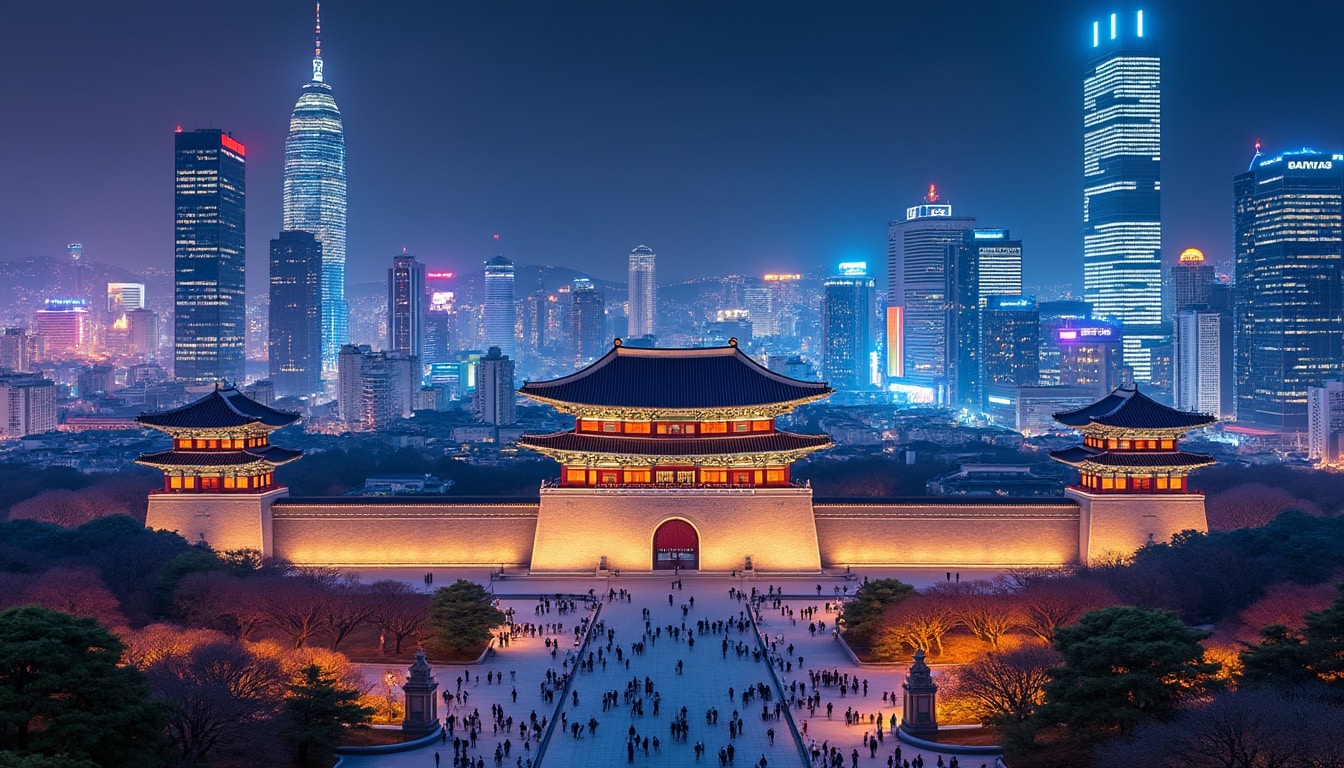
Geographical and Demographic Insights of Seoul
Strategically located in the northwestern part of South Korea, Seoul spreads across a bustling area of 233.7 square miles, split by the serene Han River. Once a significant trade route, the Han River facilitated connections with China, playing a crucial role in Seoul’s historical growth. Although it is no longer navigable due to geopolitical boundaries, it remains a picturesque hallmark of the city.
The city’s landscape is enthralling, surrounded by mountains yet nestled on the relatively flat Han River plain. Seoul’s average elevation is approximately 282 feet, providing a unique blend of urban and natural beauty. Despite this seemingly expansive layout, Seoul is one of the most densely populated cities globally, with approximately 44,776 people per square mile. Skyscrapers and high-rise apartments pepper the cityscape, accommodating its vast population.
| Aspect | Details | Emoji |
|---|---|---|
| Area | 233.7 square miles | 🗺️ |
| Population | Over 10 million | 👥 |
| Population Density | 44,776 people/sq mile | 🏙️ |
| Elevation | 282 feet | ⛰️ |
The city’s demography is predominantly Korean, but a small yet vibrant community of Chinese and Japanese also contributes to the multicultural tapestry. Seoul’s linguistic landscape is just as diverse, with Korean as the primary language interspersed with English in business and tourism.
Seoul’s geographic positioning and densely packed population contribute to its dynamic culture and economy, making it a quintessential hub for innovation and tradition alike.
Seoul’s Climate: A Symphony of Seasons
Seoul experiences a fascinating mix of climatic influences, straddling the boundary between humid subtropical and continental climates. The city showcases a quintessential four-season pattern, each offering distinct beauty and experiences.
Summers (June to August) are typically hot and humid, driven by the East Asian monsoon. The pulsating summer rains not only rejuvenate the city’s lush parks and riversides but also set the stage for vibrant cultural festivals and open-air markets. Conversely, winters (December to February) bring cold, crisp air, interspersed with dry spells and occasional snowfall, averaging about 28 snowy days annually. During this time, the city is transformed into a serene winter wonderland, perfect for enjoying hearty Korean stews and warming beverages.
- 🌞 Summer: Hot, humid, influenced by monsoon.
- ❄️ Winter: Cold, dry, with an average of 28 snowy days.
Spring and autumn, however, are perhaps the most delightful, with the city adorned by blooming cherry blossoms in spring and a dazzling palette of colors from autumn’s falling leaves. These transitional seasons are ideal for exploring Seoul’s outdoor attractions, such as the expansive parks and intricate palace gardens.
| Season | Temperature Range (°F) | Highlight |
|---|---|---|
| Spring | 50-68 | Cherry blossoms 🌸 |
| Summer | 75-85 | Monsoon rains 🌧️ |
| Autumn | 55-70 | Foliage 🍁 |
| Winter | 21-35 | Snowfall ❄️ |
Seoul’s climatic diversity not only influences its environment but also enriches the lifestyle and cultural festivities that define the city’s unique character. Learn more about Seoul’s seasonal wonders here.
The Economic Pulse of Seoul: Innovation and Enterprise
Seoul stands as the economic heartbeat of South Korea, serving as the headquarters for global giants such as Samsung, LG, Hyundai, and Kia. This metropolis generates over 20% of the country’s Gross Domestic Product (GDP), making it an indispensable player in the world of international business.
The city’s economic prowess is not just built on technology and automotive sectors. It’s a thriving hub for diverse enterprises, including retail, tourism, and manufacturing. The shopping districts, from the sprawling Dongdaemun Market to the luxurious boutiques of Gangnam, cater to all preferences and budgets. The Dongdaemun Market is renowned as the largest in South Korea, showcasing the vibrancy and diversity of Seoul’s commercial landscape.
- 📱 Major companies: Samsung, LG, Hyundai, Kia.
- 💼 Top sectors: Technology, tourism, retail.
Beyond retail, Seoul thrives as a center for culinary experiences, with the bustling dining scene supported by conglomerates like the CJ Group and renowned brands such as Amorepacific. The city’s vibrant food culture extends its reach through expansive international offerings and traditional Korean eateries.
Capitalizing on this diversity, Seoul has also become an influential player in the Asian tourism circuit, attracting millions of visitors annually eager to experience both the traditional and modern aspects it offers.
Cultural Tapestry: Traditions and Innovations
Seoul’s culture is a rich tapestry interwoven with historical traditions and innovative trends. This duality is what makes the city so compelling, offering experiences that range from visiting ancient sites to witnessing the latest pop culture phenomena.
The city is home to an array of cultural events and institutions. For instance, the Jongmyo Shrine hosts annual Confucian rituals, maintaining traditions that date back to the Joseon Dynasty. These cultural practices coexist with the city’s dedication to high-tech innovation, seen in districts like Gangnam and companies like Naver and Kakao paving the way for the digital future.
- 🎨 Preservation of ancient rituals at Jongmyo Shrine.
- 🚀 High-tech ventures by Naver, Kakao.
In Seoul, art, fashion, and music are prominent. The city hosts a range of galleries and museums, such as the National Museum of Korea, which offer insight into Korea’s artistic legacy. Meanwhile, fashion thrives with both global brands like filA and local designers drawing inspiration from the city’s vibrant streets.
| Aspect | Details | Emoji |
|---|---|---|
| Historic Sites | UNESCO-listed palaces and shrines | 🏛️ |
| Modern Culture | Gangnam, pop culture | 🎵 |
| Technological Hub | Naver, Kakao | 🖥️ |
This cultural duality is what makes Seoul such a dynamic city — a place where the past and present not only meet but thrive together. Its dynamic cultural scene makes Seoul a beacon for those seeking both historical depth and contemporary excitement. Discover more about its unique cultural curiosities.
FAQ
The following are some common inquiries regarding Seoul:
- Where is Seoul located?
Seoul is situated in the northwestern part of South Korea, along the Han River. - What is the population of Seoul?
The city boasts a population of over 10 million people, making it one of the largest and most densely populated cities in the world. - What languages are spoken in Seoul?
Korean is the official language in Seoul, with English commonly used in business and tourist settings. - What is the climate like in Seoul?
Seoul experiences four distinct seasons, with hot, humid summers and cold, dry winters. - What are the main industries in Seoul?
Seoul is a hub for industries like technology, automotive, fashion, and food, with major companies like Samsung and Hyundai headquartered there.
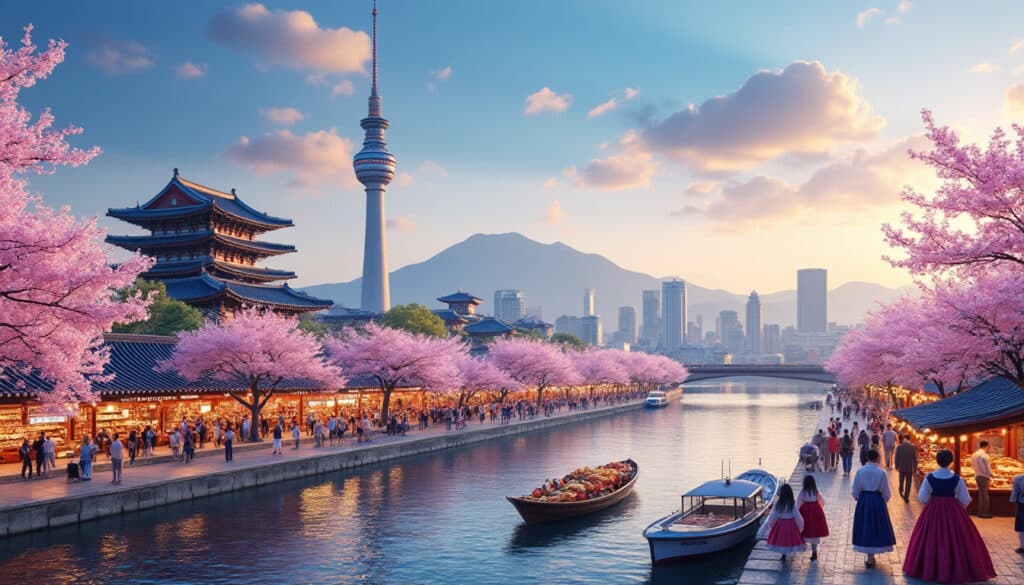
Fun Facts & Curiosities About Seoul
Seoul, a dazzling fusion of modernity and tradition, captivates every visitor with its vibrant blend of history, culture, and innovation. From being a technological metropolis to a cultural capital, the city offers a myriad of interesting facets waiting to be…
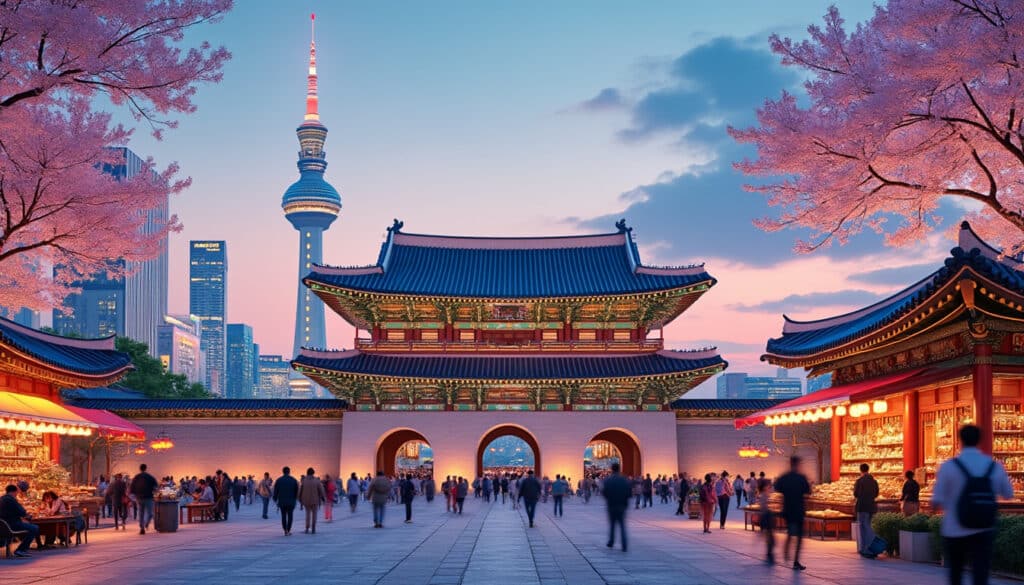
Architecture and urban features of Seoul
Seoul, South Korea’s vibrant capital, stands as a dynamic fusion of traditional culture and modern innovation. The city’s architectural wonders are a testament to its rich history and cutting-edge design principles, weaving a tapestry where ancient palaces coexist with towering…
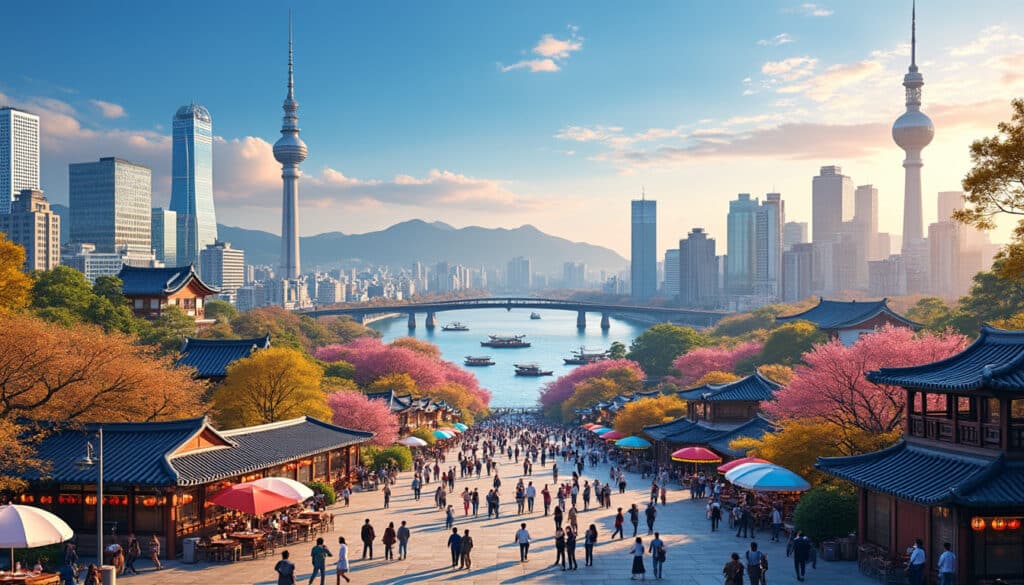
Demographics and geography of Seoul
Seoul, the vibrant capital of South Korea, stands as a testament to the country’s rapid development and cultural evolution. Nestled along the banks of the Han River in the northwestern corridor of the Penninsula, Seoul represents a harmonious blend of…
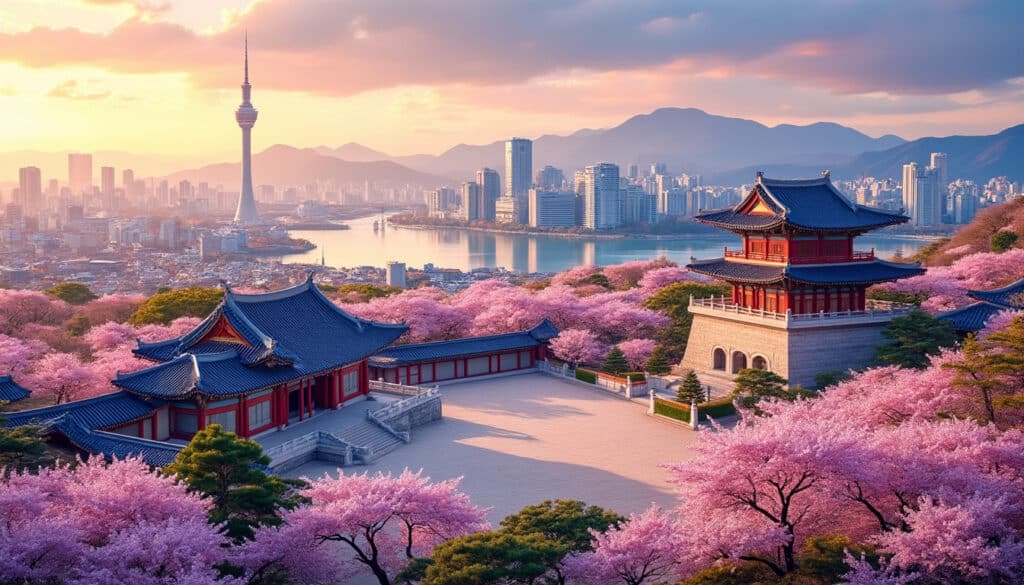
Seoul, the bustling capital city of South Korea, boasts a rich history that stretches over 2,000 years. From its ancient beginnings during the Baekje Kingdom to its modern role as a global city, Seoul has played a pivotal role in…
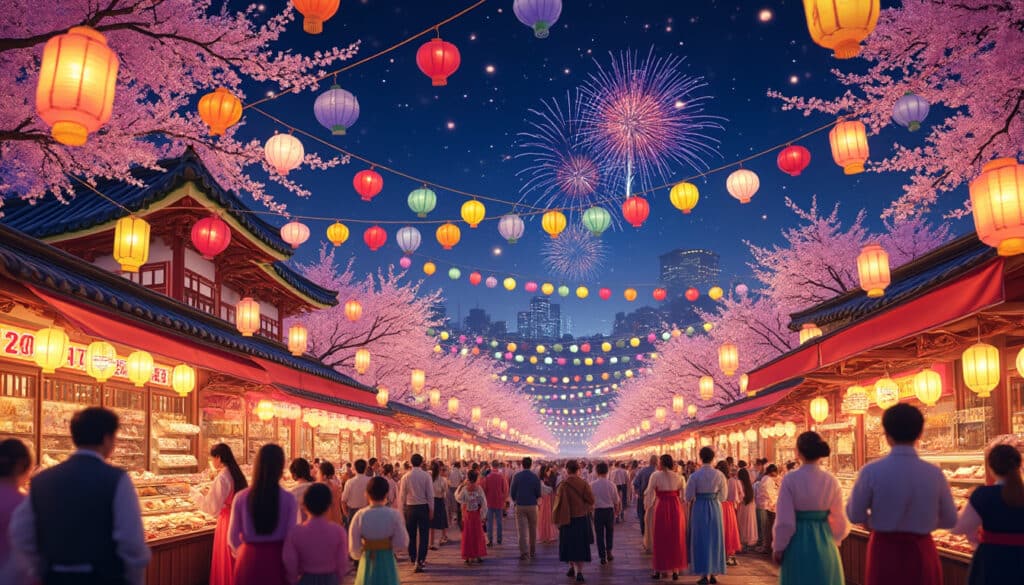
Holidays and celebrations in Seoul
Seoul, the heart of South Korea, is where traditions meet modernity, creating a unique tapestry of cultural and contemporary celebrations. The city, known for its vibrant lifestyle and rich history, transforms into a festive wonderland during public holidays. From historical…
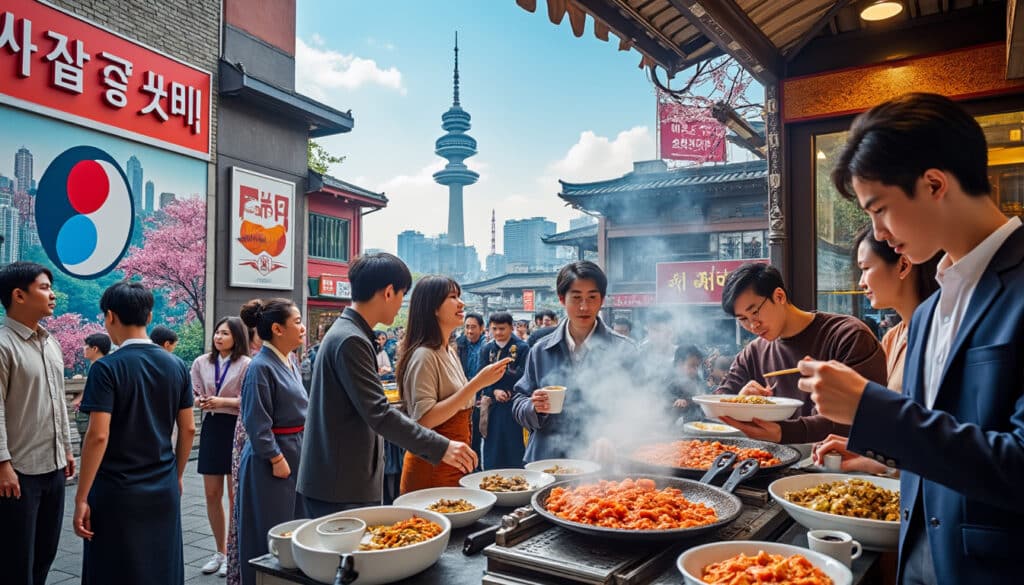
Language and spelling of Seoul
Seoul, the bustling capital city of South Korea, is not just a hub of rapid technological advancements and modern culture, but also a treasure trove of linguistic history and evolution. The city’s language and spelling conventions offer a window into…
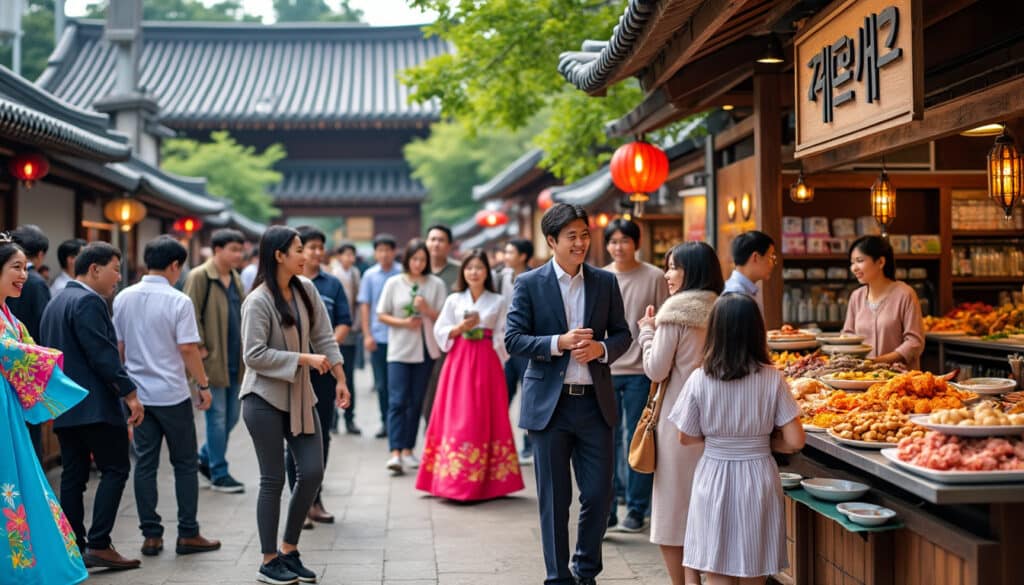
Local tips for tourists in Seoul
Seoul, the vibrant capital of South Korea, offers a fusion of ultra-modern skyscrapers and ancient palaces, bustling markets, and serene temples. However, while embarking on a journey to this dynamic metropolis, tourists often miss the oddly charming, unconventional spots that…
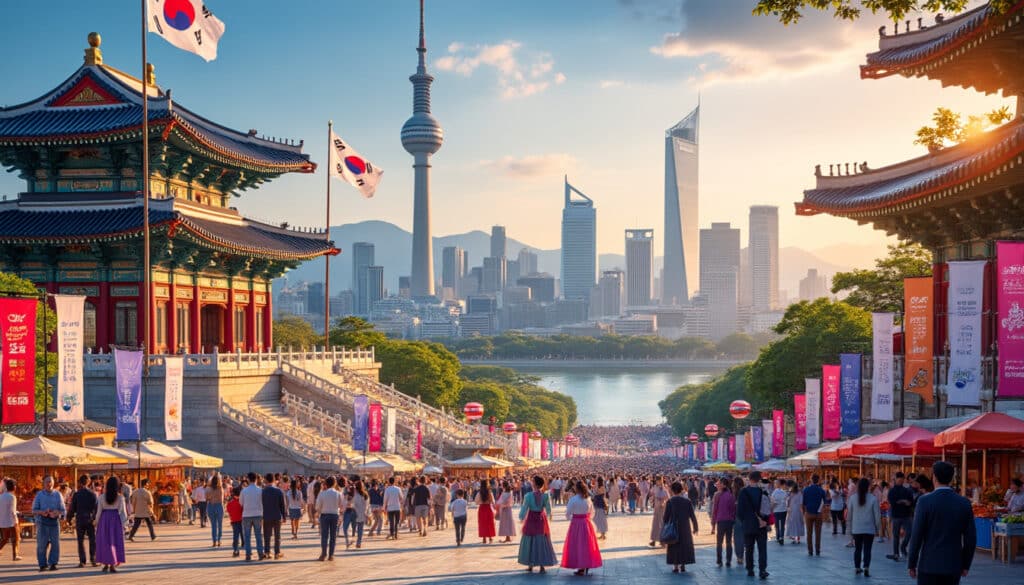
Names, flags, and identity of Seoul
Seoul, a dazzling city that serves as the heart of South Korea, has more to offer than its bustling streets, futuristic skyscrapers, and vibrant culture. Its essence is interwoven with the intriguing tapestry of its names, symbols, and identity. The…
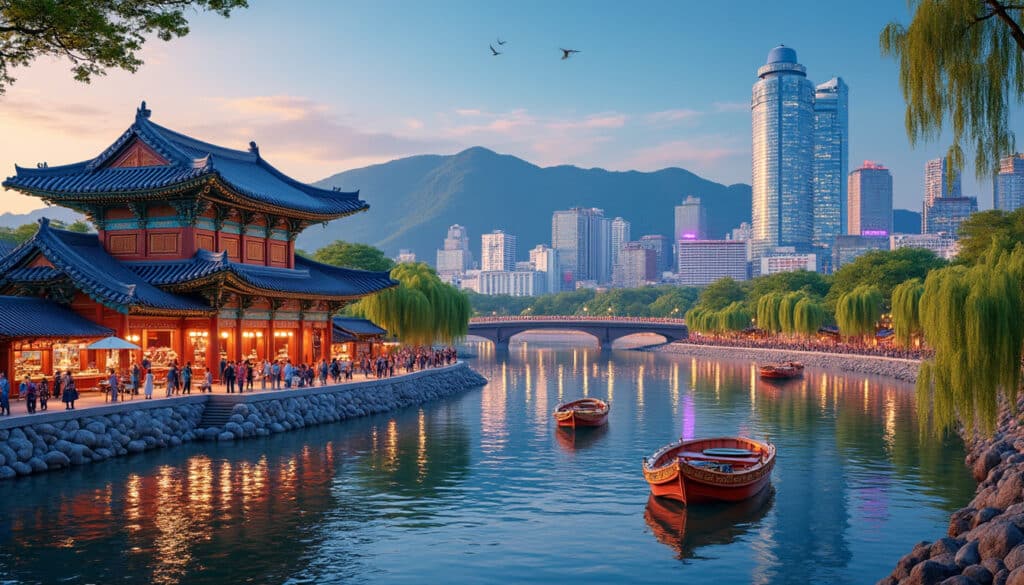
Reputation and identity of Seoul
Seoul, the pulsating heart of South Korea, is a city that gracefully bridges the gap between the past and the future. Known for its towering skyscrapers, neon-lit streets, and a burgeoning tech industry alongside historic palaces, tranquil temples, and bustling…
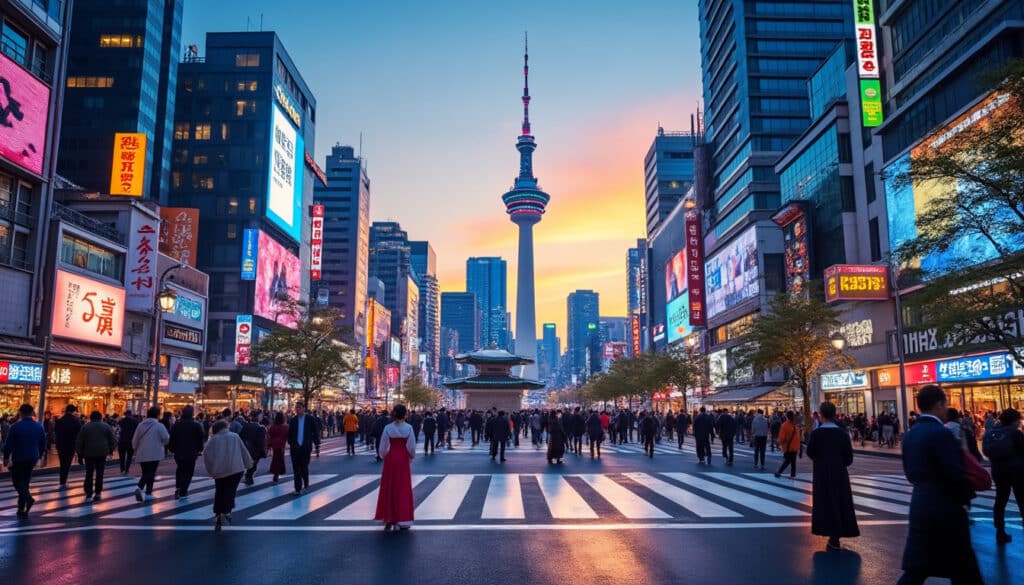
Seoul, a sprawling city that seldom sleeps, is a vibrant blend of tradition and modernity, pulsing with energy around the clock. Understanding time in this bustling metropolis is crucial for both residents and visitors, not only for practical planning but…
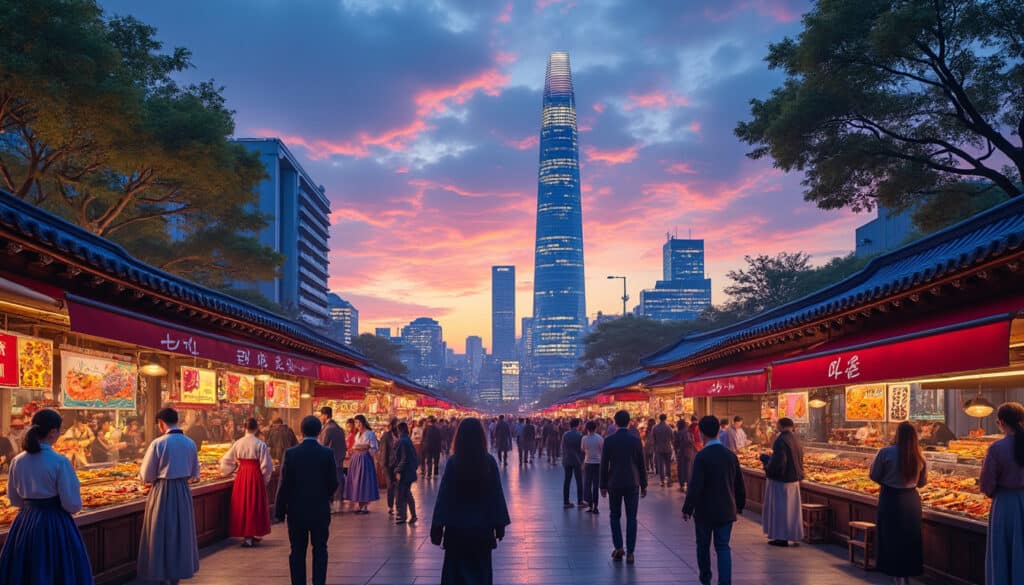
Unusual facts and social issues in Seoul
Seoul, a dazzling tapestry of ancient history and contemporary vibrance, offers explorers an eclectic mix of the unexpected and the familiar. As a hub of innovation with deep cultural roots, Seoul embodies a fascinating blend of contrasts that draw millions…
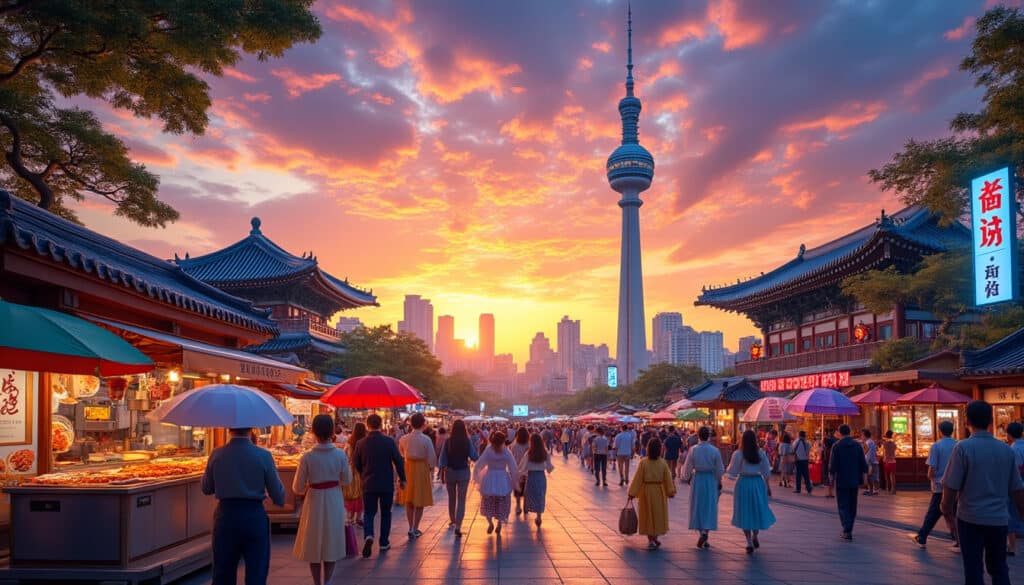
What does Seoul look, smell, feel like?
Seoul, South Korea’s sprawling metropolis, is a city that engages all the senses. As you navigate its bustling streets, you’re enveloped by a panorama of contrasting elements: sleek skyscrapers shoot up next to ancient palaces, neon-lit alleyways buzz with life…

